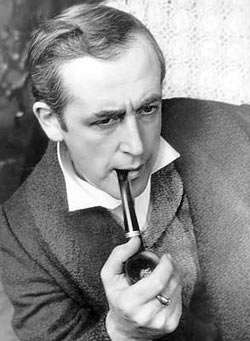The Adventures of Sherlock Holmes and Dr. Watson

The Adventures of Sherlock Holmes and Dr. Watson (Russian: Приключения Шерлока Холмса и доктора Ватсона) is a series of Soviet television films portraying Arthur Conan Doyle's fictional English detective, starting in 1979. They were directed by Igor Maslennikov. In 2006, Vasily Livanov became an Honorary MBE (Member of the Order of the British Empire) for his portrayal of Sherlock Holmes.
Plot and production
Between 1979 and 1986, Soviet television produced a series of five films at the Lenfilm movie studio, split into eleven episodes, starring Vasily Livanov as Sherlock Holmes and Vitaly Solomin as Dr. Watson. Later, a cinematic adaptation was made based on the 1986 episodes. This film was called The Twentieth Century Approaches. The series ran as follows:
- 1979 Sherlock Holmes and Dr. Watson
- 1st episode: "Acquaintance" (based on the "The Adventure of the Speckled Band").
- 2nd episode: "Bloody Inscription" (based on "A Study in Scarlet").
- 1980 The Adventures of Sherlock Holmes and Dr. Watson
- 1st episode: "The King of Blackmail" (based on "The Adventure of Charles Augustus Milverton").
- 2nd episode: "Deadly Fight" (based on "The Final Problem").
- 3rd episode: " The Tiger Hunt " (based on "The Adventure of the Empty House").
- 1981 The Adventures of Sherlock Holmes and Dr. Watson: The Hound of the Baskervilles. Two episodes based on "The Hound of the Baskervilles".
- 1983 The Adventures of Sherlock Holmes and Dr. Watson: The Treasures of Agra. Two episodes based on "The Sign of the Four" and "A Scandal in Bohemia".
- 1986 The Adventures of Sherlock Holmes and Dr. Watson: The Twentieth Century Approaches. Two episodes based on "The Adventure of the Engineer's Thumb", "The Adventure of the Second Stain", "The Adventure of the Bruce-Partington Plans" and "His Last Bow".
Unlike some of their Western counterparts, the films are very close to the literary source. Some of the departures include Holmes' easy-going and humorous demeanor, as well as comic relief provided by some of the characters (most notably that of Sir Henry Baskerville and his butler Barrymore in The Hound of the Baskervilles episode).
The series' soundtrack was composed by Vladimir Dashkevich; the introductory piece has become one of the most recognizable pieces of cinematic music in the former Soviet Union. The tune intentionally resembles an hourly musical logo played on the shortwave BBC World Service, and Maslennikov confirmed in a later interview that he wanted a very similar tune which could be identified with the spirit of Great Britain.
A street in old Riga doubles as Baker Street. The same street was used for exterior locations for several Soviet features set in the West.
Regular cast
- Vasily Livanov as Sherlock Holmes
- Vitaly Solomin as Dr. Watson
- Rina Zelyonaya as Mrs. Hudson
- Borislav Brondukov as Inspector Lestrade
- Igor Dmitriev as Tobias Gregson
- Viktor Yevgrafov as Professor Moriarty
Difference from the original title
Some scenes in the films were altered to satisfy censorship requirements or to make the plot line easier to understand. In the adaptation of A Study in Scarlet, Holmes never mentions that he uses cocaine since drug use was banned on Soviet television and in films. Also, the location of Watson's army service was changed from Afghanistan to "colonies in the East" since it was believed parallels would be drawn with the Soviet Army which had recently entered Afghanistan, which would in turn change the audience's perception of Watson's character.[1]
See also
- Sherlock Holmes (2013) - Russian TV Series
References
- ↑ (Russian) "Sherlock Holmes was censored in the Soviet Union". 6 January 2004. NTV. Retrieved 29 September 2009.
External links
| Wikimedia Commons has media related to The Adventures of Sherlock Holmes and Dr. Watson. |